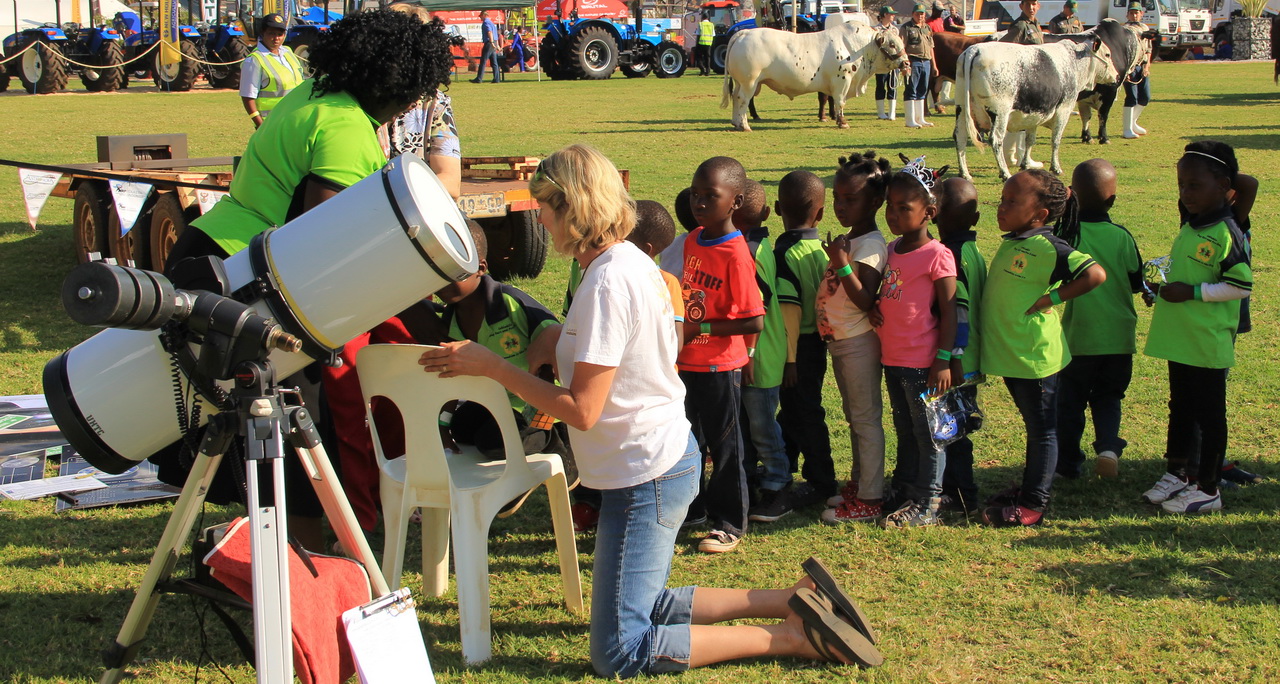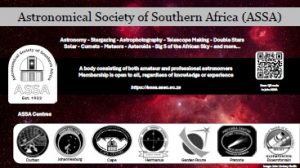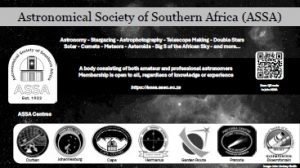
Objectives: Facilitate astronomical outreach to the public
Collaborators: Kos Coronaios, Auke Slotegraaf
Contact us: [ outreach
Outreach activities in South Africa are planned and practiced individually by all Centres and other private Observatories, with virtually no interaction between them. Anyone interested in Astronomical activities in their vicinity is therefore advised to visit the Centres’ websites or the following non-Centre sites:
Leeuwenboschfontein; Open Saturdays nearest New Moon; Spring Star Party: https://www.facebook.com/LeeuwenboschfonteinObservatory/about?_rdr
OOG (Orion Observation Group); Picnic-cum-stargazing at Taalmonument on Saturday nearest New Moon Sep -Mar: https://www.facebook.com/OrionObsevasieGroep
Any other noteworthy Outreach events will be reported here timeously.
ASSA Flyer
A call to all ASSA members:
Please download and print the ASSA Flyer in A5, back-to-back, and make it available to the public at ASSA events.
If you would like to find out more about other versions available such as customising it with a different background, contact info![]() assa.saao.ac.za
assa.saao.ac.za
Current outreach projects
ASSA outreach projects
ASSA Global Meteor Network (GMN) Outreach Project
ASSA is participating in the Global Meteor Network Outreach Project, which is a STE(A)M initiative for youth to teach them about meteors, astronomy, optics, programming and scripting, electronics, computer networks, Linux and more. The project involves placing cameras at schools to monitor the night sky and detect meteors. Downloadable tutorials will be available on a wide range of topics which teachers can use to supplement their STE(A)M curriculums. Benefits to participating schools include:
- Opportunities for learning about meteors, astronomy, optics, computers, programming and scripting, etc.
- Learners can participate in global meetings with schools in other countries involved in the GMN Outreach Project.
- Learners can show their cameras and what they have done.
- Analysing meteorite dropping fireballs, predict where they fell, and participate in searches for potential meteorites.
- Analysing meteor showers, connect them through their orbits to comets and asteroids to identify the parent bodies of meteor showers.
- Finding new meteor showers and grow the understanding of the meteor streams active in the southern hemisphere.
- Learners can present meteor and astronomy talks to each other.
IAU active projects for amateur astronomers
Explore the website links below of all the current open IAU projects which amateur astronomers in Southern Africa can join and find out the requirements, possibility of funding and how to participate.
Kilonova Catcher
http://kilonovacatcher.in2p3.fr/
Gravitational wave science and astronomy
Active: 24/May/2023 – 31/Jan/2025
Sign up to participate: https://forms.gle/AYtG3XBeaypBqr857
Global Meteor Network
https://globalmeteornetwork.org/
The goal of this project is to observe meteors, with a global network of cameras pointed at the night sky.
Active: 1/Oct/2018 – 1/Oct/2038
Sign up to participate: https://forms.gle/LHQhJ8sbi9n57SVd7
ACROSS – Asteroid Collaborative Research via Occultation Systematic Survey
https://lagrange.oca.eu/fr/home-across
ACROSS targets challenging stellar occultations.
Active: 1/Oct/2021 – 31/Dec/2033
Sign up to participate: https://forms.gle/vR8tBhNHVYosjrSB9
Hunting Outbursting Young Stars (HOYS)
https://hoys.space/
The HOYS citizen science project works with amateur astronomers on long-term photometric monitoring of young stellar clusters to find outbursting and other interesting objects for detailed follow up as well as the study of star and planet formation processes.
Active: 25/Oct/2014 – 25/Oct/2044
Sign up to participate: https://forms.gle/CmJdSMC4SXuUrMoP9
A highly effective pro-am collaboration for Planetary nebulae discovery and confirmation
Active: 1/Jan/2013 – 1/Jan/2030
Sign up to participate: https://forms.gle/HNW8LHuCRFV8Nn6v5
Astro-COLIBRI
https://astro-colibri.science/
A platform that centralises alerts of transient and multi-messenger phenomena. It enables professional and amateur astronomers to easily receive alerts based on several criteria of interest.
Active: 1/Aug/2021 – 1/Aug/2030
The Daily Minor Planet
https://www.zooniverse.org/projects/fulsdavid/the-daily-minor-planet
This project takes images of unvalidated candidate asteroids and presents them to volunteers to decide if they are real moving objects or false detections.
Active: 16/May/2023 – 1/Jan/2033
Ágora
Main objective is to present presets on astronomy in non-traditional fields
Active: 9/Jul/2023 – 9/Jul/2024
Sign up to participate: https://forms.gle/8zrknFRYfbxxHC1C8
The Deeper, Wider, Faster program
Program coordinates over 100 major telescopes operating at all wavelengths and messengers located on every continent and in space to detect and study fast transients (milliseconds-to-days duration).
Active: 14/Jan/2015 – 31/Dec/2026
Sign up to participate: https://forms.gle/xYBh5m4TLVerGn8G7
PVOL
http://pvol2.ehu.eus/pvol2/
Planetary, Virtual Observatory and Laboratory is a database of amateur observations of Solar System Planets. The database contains observations provided by amateur observers and is regularly consulted by astronomers active in the study of the atmospheres of Solar System planets.
Active: 1/Jan/2003 – 31/Dec/2035
Sign up to participate: https://forms.gle/UQ4HUYbQ5KHXJFMu8
Past outreach events
| 27 March 2024 | Educating first-year-students at the University of the Free State |


